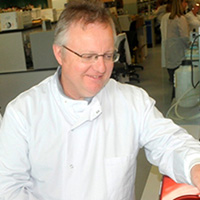Reducing infant deaths from rotavirus
The University of Liverpool has a long and successful history of vaccine research, improving their effectiveness and developing new formulations to fight against devastating infectious diseases.
A clinical trial of rotavirus vaccine in Malawi informed a WHO recommendation in 2009 that children in low income, high mortality countries should receive the rotavirus vaccine. This has dramatically reduced infant diarrhoea deaths as well as informing international policy on rotavirus vaccination programs.
Background
Prior to the introduction of a rotavirus vaccine, rotavirus was the leading cause of severe gastroenteritis, responsible for 250,000 annual childhood deaths in Africa.
The University of Liverpool has led studies of rotavirus diarrhoea in Malawi since 1997. These studies were designed to facilitate and accelerate the introduction of rotavirus vaccines into childhood Expanded Programme on Immunisation (EPI) programmes in Malawi and other low-income African countries. Vaccines developed by GlaxoSmithKline and Merck were known to work well in high-income countries but their impact on protecting children in poorer countries was unknown.
Research
A pivotal, Phase III clinical trial of the RotarixÒ rotavirus vaccine was undertaken in Malawi. The first trial of a modern rotavirus vaccine in Africa, it showed that severe rotavirus diarrhoea episodes were reduced by half. This led to a WHO recommendation in 2009 that all the world's children should receive rotavirus vaccine, with a particularly strong recommendation for those countries with a high burden of diarrhoea deaths.
Case control studies conducted between 2012 - 2014 demonstrated that national vaccination was more than 60% effective in preventing severe rotavirus diarrhoea episodes among infants in urban Malawi, with rotavirus hospitalisations reduced by over 40%. A large, prospectively conducted cohort study of 48,672 live births, then demonstrated that rotavirus vaccination reduced infant diarrhoea deaths by a third in rural Malawi, the first empirical evidence from a low-income country that rotavirus vaccination saves lives. The Liverpool-led study also demonstrated that rotavirus vaccination provides cost-effective health protection in Malawi.
Impact
The RotarixÒ vaccine was added into Malawi’s infant immunisation schedule in October 2012. In partnership with the Malawi Ministry of Health, the University undertook studies to demonstrate the impact and cost-effectiveness of rotavirus-vaccination across the country.
Through its work in Malawi, the University of Liverpool contributed to a multi-country African study led by the Centers for Disease Control and Prevention, USA which demonstrated that rotavirus vaccination did not result in the development of intussusception (blockage of the small bowel) in African infants.
Ongoing impact
- Rotavirus vaccination first introduced in 2012 resulted in immunisation coverage of 81% among one-year-olds by 2013, subsequently increasing to 90%
- Since August 2013 the programme in Malawi (under fives, population of 2,600,000) is estimated to have averted 359,100 cases of rotavirus gastroenteritis, 27,300 inpatient admissions, 1,505 deaths, and 47,600 disability-adjusted-life-years (DALYs)
- National rotavirus vaccination programmes have been introduced in 38 of the 54 African countries, preventing an estimated 24,200 deaths among children younger than five years in sub-Saharan Africa in 2016 alone
- Based on immunisation coverage between 2013 and 2020, the 2016 data allow estimation of the impact of these programmes; since August 2013, 169,400 lives were saved across Africa, and approximately 40,400,000 cases of rotavirus gastroenteritis, 3,070,000 inpatient admissions and 5,360,000 DALYs were averted
- Since 2015, most African countries that have introduced rotavirus vaccine have observed an increase in vaccine coverage, with average uptake increasing from 77% to 84% by 2018.
If you vaccinate children, it has a direct benefit for the children being immunised, who have a high risk of contracting the disease, but it also reduces the amount of circulating pathogens within the community.


